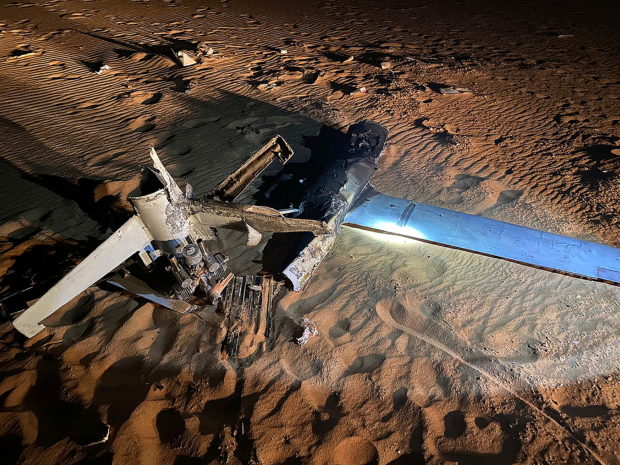Yemen’s Houthis fail in second missile attack on UAE

Remains of ballistic missile that was intercepted in an industrial area are seen, in south of Dhahran, Saudi Arabia, January 24, 2022. Saudi Press Agency/Handout via REUTERS
DUBAI — Yemen’s Houthi movement, aligned with Iran, launched a missile attack at the United Arab Emirates on Monday that targeted a base hosting the U.S. military but was thwarted by U.S.-built Patriot interceptors, U.S. and Emirati officials said.
The attack, which sent U.S. troops into bunkers, was the second in a week on the UAE, the tourism and commercial hub of the Gulf region. On Jan. 17, the Houthis hit a fuel depot in Abu Dhabi, killing three people.
The Houthis, battling a Saudi-led military coalition that includes the UAE, have said they aim to punish the Gulf state for backing militias that are blocking their attempts to capture oil-producing regions in Yemen.
A Houthi military spokesperson said the group had fired Zulfiqar ballistic missiles at al-Dhafra airbase, used by U.S. forces, and other “sensitive targets”. He said it had also launched drones towards Dubai.
“We advise foreign companies and investors in the UAE to leave as it has become unsafe,” he said, adding the group was ready to “meet escalation with escalation.”
The foreign ministry of the UAE, part of the six-nation Gulf Cooperation Council (GCC), called the attack a “criminal escalation” and said it had a right to respond.
The U.S. military said it had fired multiple Patriot missile interceptors at two inbound missiles, and acknowledged simultaneous efforts by UAE’s military.
“The combined efforts successfully prevented both missiles from impacting the base,” said a spokesperson at U.S. Central Command who represents U.S. forces in the Middle East.
The Emirati ambassador to Washington, Yousef al Otaiba, tweeted that close cooperation with the United States had helped to deflect the attack, and the U.S. State Department reaffirmed Washington’s commitment to strengthen the defenses of its Saudi and Emirati partners.
U.S. State Department spokesman Ned Price, however, said the Houthi attacks on the UAE and Saudi Arabia, along with Saudi-led coalition airstrikes in Yemen, represented a “troubling escalation” in violence, and he called anew for a ceasefire.
Price declined to say if U.S. President Joe Biden’s administration would accede to a UAE request to restore the Houthis to a U.S. list of foreign terrorist groups, reimposing financial sanctions on them. Biden said last week the request was under consideration.
But Price noted that the group was striken from the list last February out of concerns the sanctions could result in cuts in humanitarian aid and commercial imports of food and other necessities to Houthi-controlled areas.
“We are taking a look at the appropriate response,” he said.
The Houthis have repeatedly carried out cross-border missile and drone attacks on Saudi Arabia, but by targeting the UAE they have raised the stakes of a conflict largely seen as a proxy war between Saudi Arabia and Iran.
Air strikes on Yemen, which the Saudi-led coalition says are aimed at crippling Houthi capabilities, killed at least 60 people in Saada province on Friday, and about 20 people in the Houthi-held capital Sanaa on Tuesday.
The U.S. embassy issued a rare security advisory for the UAE, urging its citizens to “maintain a high level of security awareness.”
Risk calculations
“This is absolutely an escalation and changes the regional dynamic,” said Karen Young, director at the Middle East Institutes’ Economics and Energy Programme.
“The safety of the GCC now has risk calculations that approach what we know in other parts of the Middle East,” she said, citing potential risks to energy pipelines and production facilities as well as civil aviation.
Dubai’s main stock index closed down nearly 2%, while Abu Dhabi’s ended the day flat. Higher oil prices were providing support to markets, analysts said.
The attacks have rattled some Abu Dhabi residents.
“Overall I feel safe but I don’t know how it will escalate,” said 19-year-old American medical student Tahlia Rivera.
The UAE published a video of what it said was an F-16 warplane destroying a Houthi missile launcher in Yemen.
The Houthis on Monday said they had also attacked Saudi Arabia, which reported material damage from remnants of an intercepted missile in a southern industrial area.
On Sunday night, a missile fell in another southern region, injuring two foreigners.
The coalition intervened in March 2015 after the Houthis ousted the government from Sanaa. The group says it is fighting a corrupt system and foreign aggression.